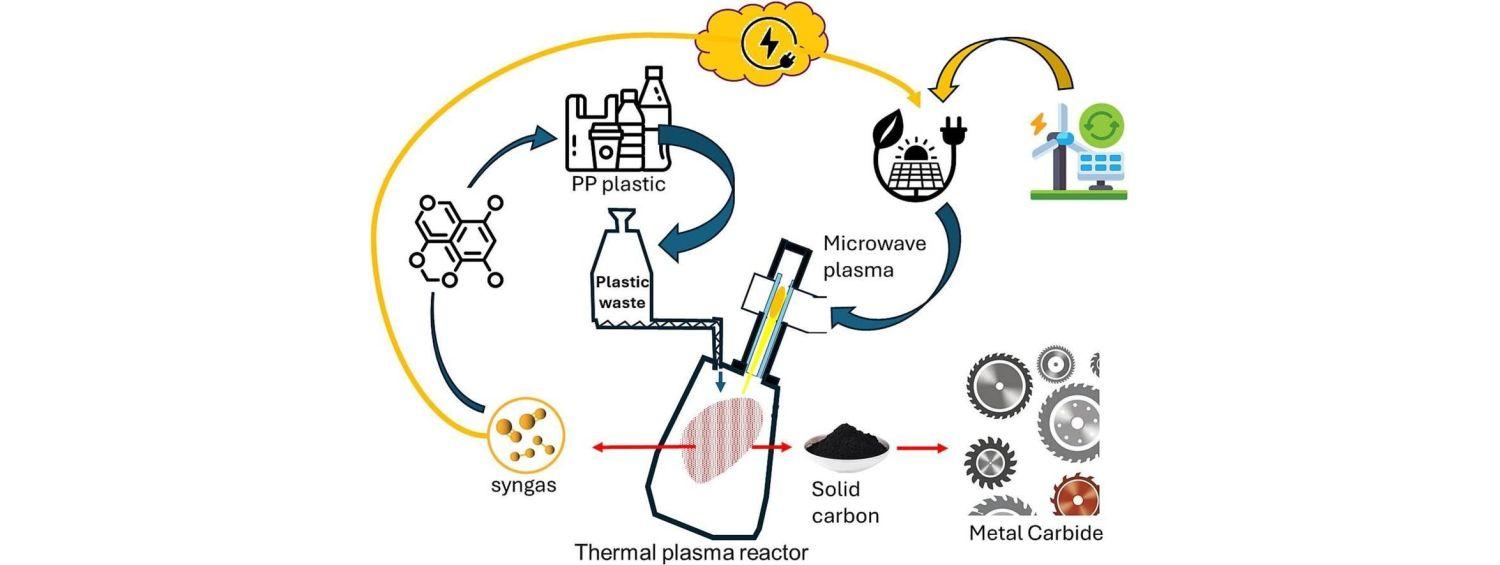
Energy and materials of the future from plastic waste
Scientists from UCT Prague demonstrate that even non-recyclable polypropylene can have a second life – in the form of synthesis gas and technically valuable carbon.
Plastic Waste as One of Today’s Greatest Environmental Challenges
Particularly problematic is polypropylene – a durable, lightweight, and low-cost plastic widely used in packaging, the automotive industry, and textiles. Although it is a thermoplastic, its recycling is often uneconomical or technologically difficult. That’s why scientists from UCT Prague sought a different way to deal with this type of waste.
And they found one.
A team composed of researchers from several institutes of UCT Prague, the Czech Academy of Sciences, and other institutions published their findings this year in the prestigious Chemical Engineering Journal. In the article titled "Thermo-Chemical Recycling of Polypropylene via High-Power Microwave Plasma Gasification: Syngas and Metal Carbide Production", they present a technology that uses high-power microwave plasma to convert waste polypropylene into synthesis gas (syngas) and solid, highly reactive nanostructured carbon.
Both products have clear applications:
Syngas – a mixture of hydrogen and carbon monoxide – can be used as fuel or as a feedstock for further chemical processes.
Nanostructured carbon – thanks to its high reactivity, it can serve as a precursor for the production of metal carbides or other advanced composite materials.
Chemistry, Materials, and Plasma
The research involved experts from the Department of Inorganic Technology, the Department of Metals and Corrosion Engineering, and other UCT Prague facilities. The project is a successful example of interdisciplinary collaboration, combining expertise in inorganic chemistry, materials engineering, and plasma technologies.
The UCT Prague contributors to the publication are:
- Jafar Fathi, M.Sc.
- Ing. Michal Lojka, Ph.D.
- Ing. Adéla Jiříčková
- Prof. Ing. Ondřej Jankovský, Ph.D.
- Ing. Jan Riedl
- Ing. Petr Kratochvíl
- Ing. Hana Thürlová
- Ing. František Růžička
- Assoc. Prof. Ing. Filip Průša, Ph.D.
This technology is currently in the laboratory research phase. In the future, however, the authors plan to scale it up to a pilot level and seek industrial partners for real-world application – for example, in the energy sector or in the processing of non-recyclable plastic waste.
A Circular and Sustainable Future
The publication was created within the framework of UCT Prague’s project activities under the OP JAK (Operational Programme Jan Amos Komenský), specifically the EcoStor project, which focuses on research into sustainable technologies, recycling, and energy storage. Verification of the applicability of nanostructured carbon was carried out as part of the GAČR project (24-10767S, Advanced high-entropy alloys reinforced by in-situ prepared carbides from various types of nanostructured carbon precursors).
The scientific outcome shows that even plastics currently ending up in landfills or incinerators can be reused – not only as energy, but also as functional material for modern industry.
Link to the publication: https://www.sciencedirect.com/science/article/pii/S1385894725027366#f0075+







